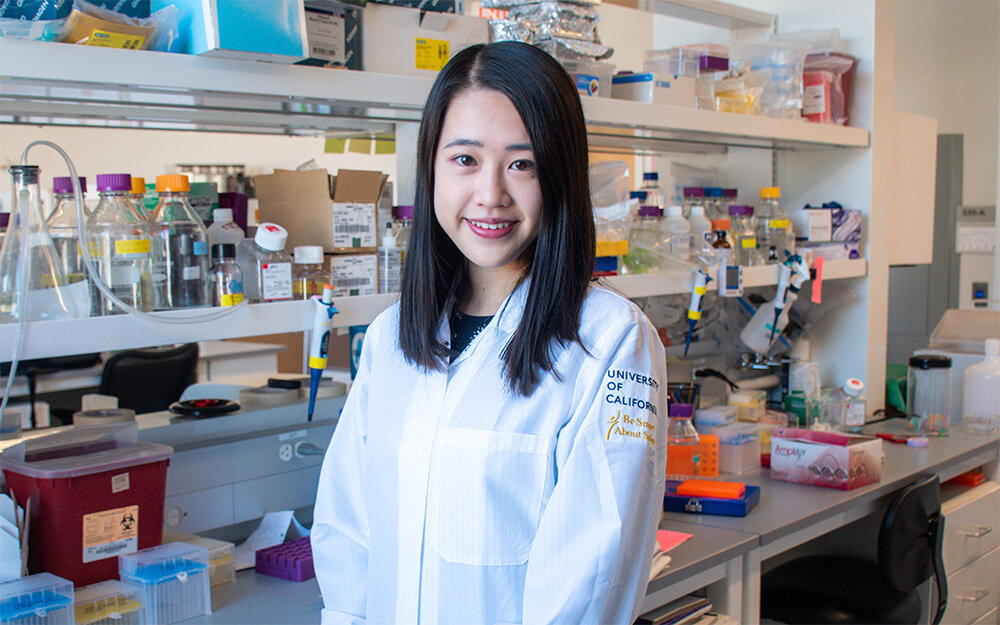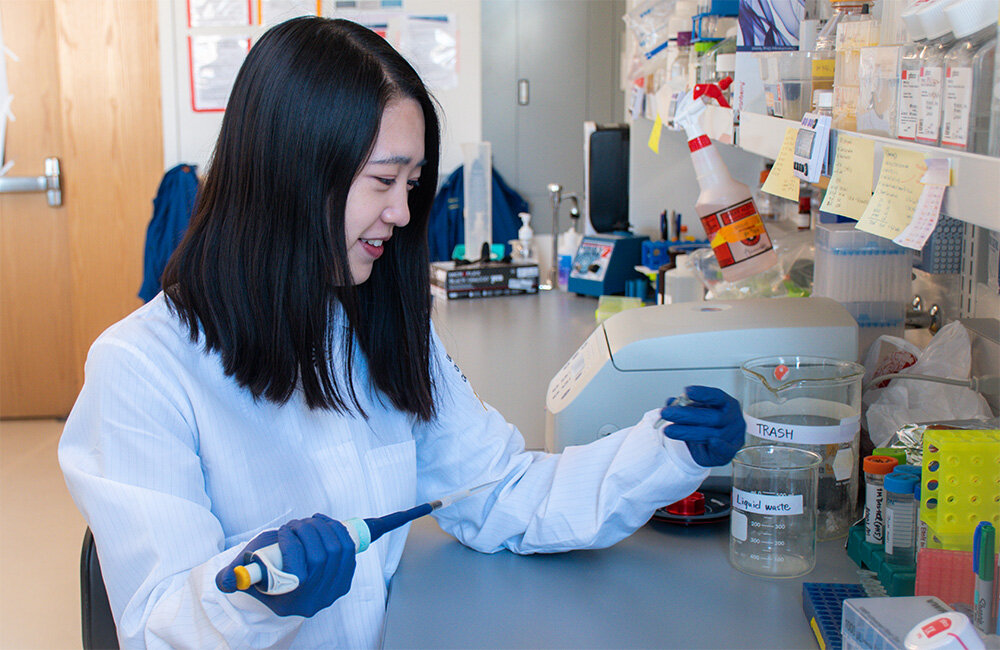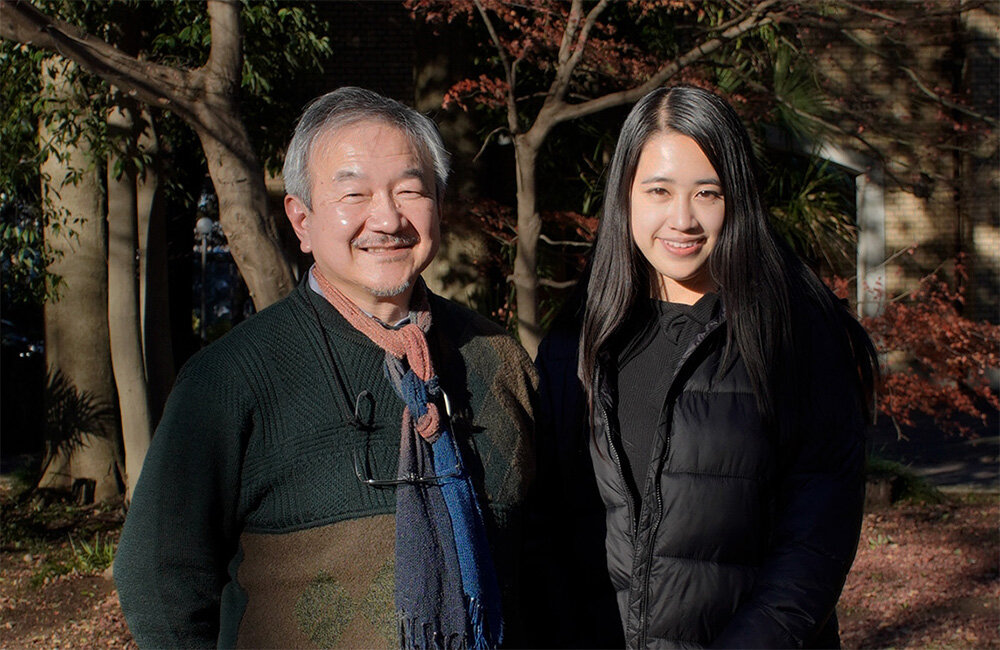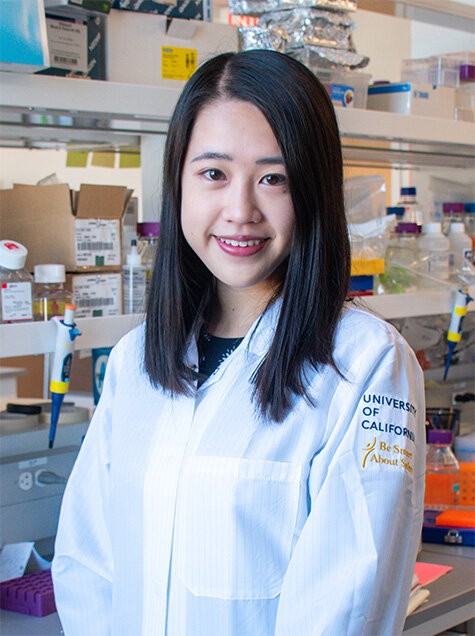PhD candidate in Endocrinology (G3), University of California, Berkeley
B.A. in Arts and Sciences (Major in Biology), ICU College of Liberal Arts Division of Arts and Sciences, March 2020
M.A. in Natural Sciences (5-year Program), ICU, March 2021
Seeking to Unravel the Mysteries of the Genes that Control Aging and Longevity to Support Human Health

A fascination with studying complex biological phenomena led her to a leading US university
I am currently a PhD candidate at the University of California, Berkeley, based in a laboratory that specializes in aging-related research. Specifically, I am working on a project investigating the function of sirtuins (a family of substances known as "aging control genes") in the brain, with the goal of conducting research that can help to shed light on the mechanism of Alzheimer's disease onset, considered to be a result of brain aging. My research also aims at uncovering potential therapeutic possibilities.
Alzheimer's disease is the most prevalent form of dementia, with more than 50 million sufferers worldwide. Although advances are being made in the development of drugs that slow or alleviate the progression of symptoms, there is no effective cure for now, nor even any clear understanding of the mechanism of disease onset. To find an effective treatment, it is essential to elucidate the fundamental mechanism of how the human brain changes as it ages and understand how aging increases susceptibility to Alzheimer's. I believe that the key to unlocking these mysteries lies in basic research focused on the mechanism of aging.
The term "metabolism" refers to the chemical reactions involved in the synthesis and decomposition of various molecules in living organisms, but there are numerous complex metabolic pathways in the body that contribute to the maintenance of living organisms. I first developed an interest in studying unexplained biological phenomena while working on microbial genetics under Prof. Tatsuo Nunoshiba at ICU. I was studying mechanisms of defense against DNA damage to living organisms, focusing on the E. coli bacterium. I found the process of trying to grasp the unknown functions of genes and unraveling the roles of different genes very fulfilling. This experience inspired me to continue pursuing research on the elucidation of complex in vivo biological phenomena. The life phenomenon that interests me most is aging. I believe that figuring out the molecular and cellular mechanisms that control aging will make it possible to delay aging and prevent aging-related diseases, thereby helping to maintain and improve human health. My desire to play a part in this effort is what has brought me here.
In the first and second year of my PhD program, I had to take some compulsory classes. But now, in my third year, I am focused mainly on my own research project, although I am also taking an experimental course as a Teaching Assistant (TA) and supervising undergraduate students in my lab. On top of this, from June 2023, I will be part of the first cohort of QUAD Fellowship recipients. Under this program, 25 students from each of the four QUAD (Quadrilateral Security Dialogue) member countries (Japan, U.S., Australia, and India) are awarded a scholarship each year. To be eligible, students must be enrolled in a Master's or PhD program in a STEM (science, technology, engineering, and mathematics) field. As well pursuing their research in the U.S. with the program's support, the recipients participate in various workshops and educational programs. In June, a kick-off event will take place in Melbourne, Australia, in the form of a one-week face-to-face program. I am very much looking forward to interacting with outstanding students from all over the world.

The broad perspectives and solid skills cultivated in my science education at ICU
My curiosity about human health began in my high school days, when I took a strong interest in food science and nutrition, which relate visibly and directly to health. There are many ways to get involved in human health, however. As a high school student, I felt uneasy about narrowing my focus to a single specialty, because my horizons were not very broad yet. I felt that I should learn about a wide variety of things before deciding what my strongest interests were. And that's when I learned about ICU's liberal arts education. I only had a vague notion of ICU as a university focused on humanities, but when I found out that I could choose to major in biology, chemistry, or other science while freely taking various other subjects, I was very attracted. Since I wanted to interact with people from all over the world, I had worked hard at learning English. For this reason, the opportunity of a bilingual (Japanese-English) education was another decisive factor in choosing ICU.
After enrolling at ICU, I studied a wide variety of disciplines, although my main focus was biology. An appealing aspect of science education at ICU is that it allows students to consider a multiplicity of perspectives through collaboration with a rich diversity of students. For example, students majoring in humanities and social science commonly participated in my science lab classes. Hearing a variety of viewpoints helped me to change some previously unquestioned perceptions and gain new insights. There were sometimes international students in my practical classes too, giving me an opportunity to learn about differences in education between countries. In addition, the small class sizes at ICU make it possible for students to receive very thorough instruction and guidance. My experience of carefully and properly learning the fundamentals of experimentation has provided a solid platform for my current research path.
In addition to biology, I developed an interest in psychology, a subject I had never studied at high school. I found the academic approach to the principles of human emotion and behavior fascinating. In my classes, I also studied the functions of the brain, to better understand the relationship between brain and mind. I found this knowledge very useful in my current research, and almost every day it occurs to me that all disciplines are fundamentally connected. Another memorable experience was studying archaeology, which would have been very difficult at any other university. I was greatly impressed to observe the excavation, display, and preservation of ancient earthenware on campus. The importance of learning not just in the classroom, but also by seeing, touching, and feeling is another thing I learned at ICU.
For language, the environment at ICU surpassed my expectations. Although I had never lived or studied overseas, I started learning English seriously at junior high school level in Japan. Thanks to my love of English through my junior high and high school years, as well as the thorough preparation and review afforded by ICU's English for Liberal Arts Program (ELA), I was able to acquire a reasonable level of academic English proficiency. Then in my third year at ICU, I participated in a 10-month exchange program at the University of California, Riverside. I took many classes that interested me, both in my major of biology, and various other fields. As a result of studying specialized content in English across a wide range of disciplines, both in classes and through discussions, I now have no difficulty using English in my classes and research work at an overseas graduate school.
The importance of confronting the future unhurriedly in a place where you can be yourself
At ICU, I made some irreplaceable friends through dormitory life. Many of the ICU friends I have kept in touch with since graduating are people that I got to know by living in dorms. By sharing difficult and painful experiences as well as happy times, we were able to build relationships of deep mutual understanding. I don't think this would have been possible if I had not stayed in the dorms at ICU. Dormitories at Japanese universities are not very common, and even in so-called dormitories, students often have their own rooms. So, dormitories like those at ICU, in which two students live together in one room, are quite unusual. Although I was sometimes flustered by roommates with different personalities and life rhythms, dormitory life gave me the chance to learn the art of finding a way to get along smoothly with anyone. I'm now putting this skill to good use in the US, where I interact with people from many different backgrounds.
When I look back at my time at ICU, one of my most important influences was Prof. Nunoshiba. When I consulted with him, he never rejected my ideas. He would simply shoot back questions, asking me how I planned to develop and realize my ideas. I remember that during my third year, which I spent studying abroad, I consulted him frequently through online meetings and emails about my career path. I also did some job hunting for a while, but thanks to my discussions with Prof. Nunoshiba, I was able to formulate a clear vision for my next career move. So, I ended up turning down corporate job offers to pursue further research at the graduate school of a leading American university. Without Prof. Nunoshiba's guidance, I don't think I would be the person I am today. He has been a great support to me, and even since I graduated, he continues to warmly keep in touch with me.
I feel that I was very blessed at ICU, both in terms of friends and teachers. ICU is also the place where I have most felt that I could be myself. At high school, I suppressed my assertiveness, because I was too concerned about standing out from others. In contrast, amid the diversity of the ICU campus, I felt free to express my views to friends and teachers. Although only a small number of other students went on to PhD programs overseas, I was able to confidently choose this career path without any anxiety about being different to the people around me.
I have three more years to complete my PhD program. I would like to advance the research project I am currently tackling so that I can leave behind some solid findings at the end of the program. After completion, I would like to continue doing research in a field that allows me to benefit society in some way. I also want to make use of the broad horizons I cultivated at ICU in my research, so that I can contribute to human health, one of my passionate interests since high school.
To anyone who will be spending time at ICU, my advice is to take your time in the ICU environment to think long and carefully about what you want to do in the future. Even if you don't have a clear goal when you enroll, there's no reason to be anxious. I only decided on going to a graduate school overseas at the end of my third year as an undergrad at ICU. When I first arrived at ICU, I never thought for a moment that I would end up doing graduate studies outside Japan. Instead of worrying too much about the future, I tried keep my mind focused on working as hard as possible on the present challenge. Whether it's a single assignment or a graduation research project, if you apply yourself seriously to the task at hand, possibilities and choices will naturally open up. And you will also learn how to make the right choices. So don't be in a hurry to narrow your interests to one thing only. Just apply yourself fully to whatever interests you and keep challenging yourself.

Ms. Maruichi, with her mentor, ICU Professor Tatsuo Nunoshiba (left)
Profile
Ayane Maruichi
PhD candidate in Endocrinology (G3), University of California, Berkeley
B.A. in Arts and Sciences (Major in Biology), ICU College of Liberal Arts Division of Arts and Sciences, March 2020
M.A. in Natural Sciences (5-year Program), ICU, March 2021
Majored in Biology at ICU, studying microbial genetics in the Nunoshiba Lab, using Escherichia coli as a model organism. In her third year at ICU, she participated in a 10-month exchange program at the University of California, Riverside. After completing ICU's 5-year Program to earn her Master's degree in 2021, she joined the Endocrinology PhD Program at the University of California, Berkeley. Her current research is focused on genes that serve as therapeutic targets for Alzheimer's disease. In 2022, in recognition of her academic and research record, she was selected for the inaugural cohort of the QUAD Fellowship, a scholarship program that kicks off in June 2023.




